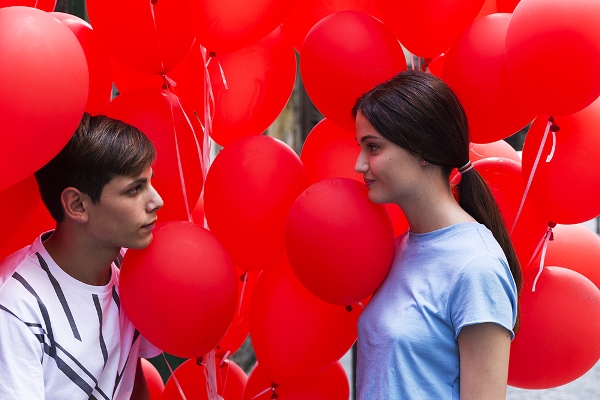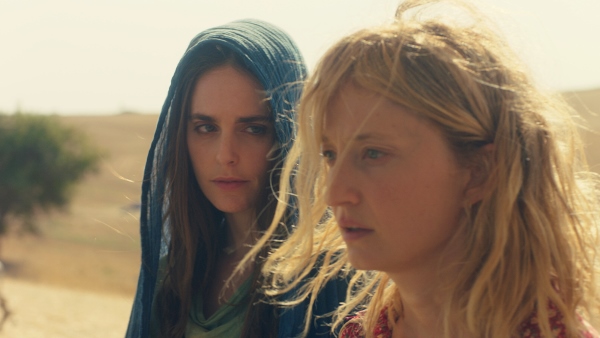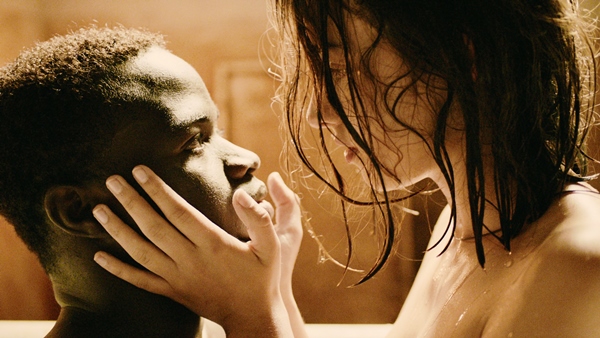Three very different films come to a stop with open endings in Open Roads: New Italian Cinema, presented by Film at Lincoln Center and Istituto Luce Cinecittà. One film is based on an Italian best seller, another was a surprise hit at Cannes, and the third is a subtle gem and the sophomore effort of a woman director. Characters confront uncertain or undesirable futures but keep on their paths the best—or only—way they know how. While the films grapple with Italy’s never-ending political issues, the situations the characters face seem to lie far beyond any promise or political solution.
PIRANHAS
A sense of fatalism surfaces most clearly in Claudio Giovannesi’s Piranhas, a richly photographed cavalcade of moral rot and grim fates foretold. Handsome teenager Nicola (Francesco di Napoli) lives in Naples’s hard-bitten Rione Sanita’ quarter with his single mother and younger brother. He and his pals have no money to attract girls or spend on fancy clothes, so Nicola jumps at the chance to enroll as a drug dealer for the local mob.
The script was co-adapted by Giovannesi and Roberto Saviano, writer of Matteo Garrone’s acclaimed Gomorrah and the book on which Piranhas is based. The parade of gold-blinged interiors, greasy tough guys, seedy social rituals, and motorino squads barreling through the gorgeously decayed Neapolitan streets on the way to the next showdown all play like Gomorrah-light, with no event seemingly more significant than any other in the relentless cycle of predation. Di Napoli’s confident performance and some sharp cuts from scene to scene make the movie more watchable; a death finally brings home a sense of lost innocence. No matter how jaunty he looks on his motor scooter, the only end for Nicola is to kill or be killed. Here there’s no other way out.
LUCIA’S GRACE
The lord works in mysterious ways. So does the Directors’ Fortnight at the 2018 Cannes Film Festival, having selected Gianni Zanasi’s Lucia’s Grace for the Europa Cinema Label Prize for best European film and the sidebar’s coveted closing night slot. To what does this muddled movie owe the honor?
Perhaps to the presence of Alba Rohrwacher, who has emerged as a stalwart of Italian cinema with excellent acting and intriguing projects and who heroically carries a fretting-prone character on thin shoulders. Rohrwacher plays Lucia, a jittery, disheveled land surveyor and single mom afflicted by a vision of the Virgin Mary (the expressionless Hadas Yaron). The blessed virgin insists that Lucia build a church on the site of a corruption-riddled boondoggle construction project Lucia’s involved in. She physically attacks Lucia in bouts of clumsy jiu-jitsu and hair-pulling at gatherings, where no one else can see the Virgin Mary. Onlookers merely think that Lucia is nuts as she writhes and moans on the ground.
To this already patience-testing premise, the movie throws in Lucia’s wordy and tedious tiffs with an irascible on-and-off boyfriend, problems with her morose teenaged daughter, an environmental twist, and a subplot involving a jazz musician/dad with an old heroin problemino and an overactive social media account. Kitchen-sink and magic realisms blend like dish detergent and fine wine. By the time an out-of-nowhere conflagration strikes, you feel like you’ve been through quite a ride with a ditzy character who, for all her pluck and inspiration, can’t seem to get it together enough to once drag a comb through her hair.
TWIN FLOWER
Mysterious as Piranhas is predetermined, hushed as Lucia’s Grace is noisy, Laura Luchetti’s striking, and atmospheric film unfolds like a dark fairy tale. A silent teenage girl named Anna (Anastasiya Bogach) joins Basim (Kallil Kone), a Malian refugee, on a journey through rugged Sardinia. Both young people are being hunted, but for different reasons. The relationship between the two will develop slowly and poignantly in the face of dangers seen and unseen.
Although the movie touches on Italy’s refugee crisis, this is a movie that creates its own world connected to but somehow apart from any political issues. Long passages proceed in silence, questions go unanswered, people watch each other carefully, and the landscape buzzes with beauty and menace as the two voyagers pass through. Little by little, flashbacks shed light on Anna’s showdown with a sinister pursuer—a psychopath now on Anna’s trail with The Night of the Hunter–like implacability. Trying to protect Anna and survive in a strange land, the kind, vital, and courageous Basim faces racism and something even darker.
Twin Flower is artistically—beautifully—shot, scored, and sound designed. But for all its artsy pedigree, the film wields an intense emotional power. You wish desperately for a better fate for the lonely, troubled pair at its center. While Luchetti delicately and characteristically holds back from giving away the end, you feel real despair at the shadows falling across the possibility of a better fate.
Open Roads runs from June 6–12 at Lincoln Center, New York City.









Leave A Comment